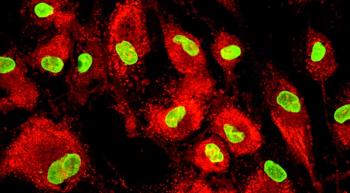
Patients with recurrent, metastatic or persistent cervical cancer may benefit from the TIL immunotherapy LN-145.

Patients with recurrent, metastatic or persistent cervical cancer may benefit from the TIL immunotherapy LN-145.

We've got a sneak peek at what’s inside CURE®'s 2019 Genitourinary Cancers special issue.

Patients with recurrent or metastatic cervical cancer were treated with combination Opdivo and Yervoy in the CheckMate-358 clinical trial.

From a chemotherapy drug shortage to Eddie Van Halen revealing a cancer diagnosis, here’s what is making headlines in the cancer space this week.

College football anchor Rod Gilmore uses his voice to help raise awareness following a multiple myeloma diagnosis.

From a health update from Alex Trebek to the sudden death of Bernie Sander’s daughter-in-law, here’s what is making headlines in the cancer space this week.

A four-time breast cancer survivor and winner of CURE®’s art cover contest shares what drives her passion.

A phase 3 trial compared Keytruda versus chemotherapy for patients with advanced pretreated malignant pleural mesothelioma.

A physical therapist and testicular cancer survivor shares the health benefits of rehabilitation after cancer.

The tumors of patients with non-small cell lung and renal cell cancer shrunk following treatment with pegilodecakin plus immunotherapy.

From Matthew Knowles revealing a male breast cancer and BRCA2 diagnosis to a sarcoma survivor donating thousands of toys in lieu of birthday presents, here’s what is making headlines in the cancer space this week.

Here’s a look at what’s inside our 2019 Immunotherapy special issue.

A man who received chimeric antigen receptor-T cell therapy shares his firsthand account.

From a freezer failure that lost the stem cells of some patients with cancer to a documentary about one of the pioneers of immunotherapy, here’s what is making headlines in the cancer space this week.

Treatment with Opdivo (nivolumab) plus Yervoy (ipilimumab) led to a 44% response rate in patients with high-grade neuroendocrine tumors, according to phase 2 study findings.

The four-drug regimen of Darzalex in combination with Velcade, Thalomid and dexamethasone has been approved for the treatment of newly diagnosed patients with multiple myeloma who are eligible for autologous stem cell transplant.

Cutting-edge treatment is not out of reach, thanks to a little guidance from the Cancer Research Institute.

Topical immunotherapy may help prevent the second most common type of skin cancer in the United States, according to study findings published in JCI Insight.

Here’s a look at what’s inside our 2019 Hematology special issue.

For some patients with melanoma, eating a diet rich in fiber could lead to an improved response to immunotherapy, according to findings presented at this year’s American Association for Cancer Research annual meeting.

Cediranib combined with platinum-based chemotherapy helped patients live longer than placebo.

From a treatment update from Alex Trebek to possible cancer concerns over a popular heartburn medication, here’s what is making headlines in the cancer space this week.

After learning to walk again following a life-changing multiple myeloma diagnosis, Richard Bell takes on Mount Washington.

Many patients with blood cancers may be candidates for autologous or allogeneic transplant.

Receiving supportive care can help ease symptoms of cancer and its treatment, improving quality of life for patients. But many with multiple myeloma are missing out on aspects of this type of care, according to study findings published in Cancer.

A phase 3 trial showed a 33% reduction in the risk of death when patients were treated with Erleada compared with placebo.

Dr. Thomas Weber has died following a ‘short but fierce’ fight with mantle cell lymphoma.

Patients and survivors shared messages of hope and enjoyed an evening of fun at the 11th annual celebration sponsored by Hackensack Meridian Health.

Having a parent, sibling or child with blood cancer raises an individual’s risk of also receiving a blood cancer diagnosis, according to the results of a large European study.

The oral medication Balversa (erdafitinib) shows promise in patients who have FGFR3 gene alterations.